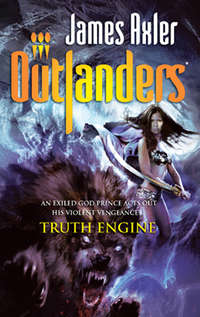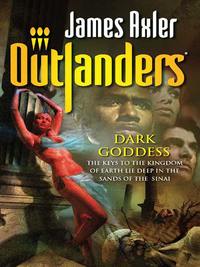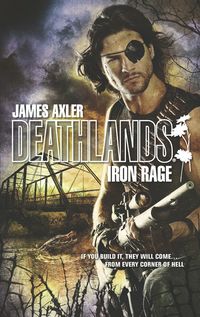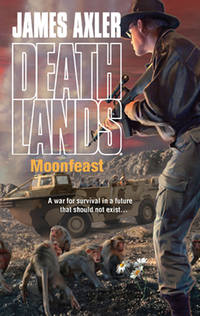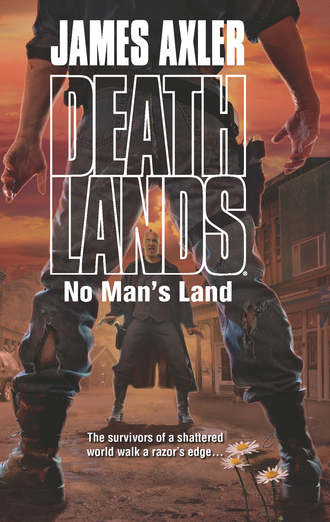
Полная версия
No Man's Land
They had jumped into a redoubt that afternoon from Puerto Rico, courtesy of the mysterious mat-trans network. They and only a few others knew of the device’s existence. Mildred had long since decided not to cling to those memories. They were nothing she cared to cherish. And there were so many of them...
The redoubt had been thoroughly gutted. Like some, it didn’t seem to have successfully weathered the storm that had blown away the world Mildred had known. What had left it with its door jammed open she couldn’t guess; the only nuke hot spot she knew of in the vicinity was near what had been Des Moines, miles in the northwest. There didn’t seem to have been a lot of other nukes going off in the immediate vicinity. The colossal earthquakes that accompanied the missiles’ fall might have done the trick.
Some animals had ventured inside. Small skeletons lay among scattered debris that had long since itself decayed to a sort of compost in the echoing, sterile concrete corridors. Soil and rock slipping from the hillside beneath which the redoubt was buried had covered the entrance long ago. They’d had a hard job working with knives and a folding Swiss-made entrenching tool J.B. carried strapped to his pack before digging their way out into what remained of the day’s light.
They’d been rewarded by the sounds of shots and shouts and screams coming their way, fast.
By running flat-out they’d made it to the shelter of a stand of saplings by a small stream that meandered through a valley amid low round hills. Fortunately the spring bloom had leafed out the brush that was clumped around and between the skinny trees enough to offer concealment for the companions.
The two men who were carrying on a running fight on horseback raced over a nearby ridge. From the thick green-gray smoke cloud that traveled along with the skirmish, the companions could tell they were firing black-powder blasters, something prevalent in parts of the Deathlands where stocks of predark ammunition were starting to run dry. About twenty other riders seemed to be trying to kill one another, as well.
The fighters had managed to do little apparent damage to one another before their running fight headed up the far slope of the little valley and away out of sight. Still they left a couple of men lying on the ground behind them. One lay stone-still. The other moved and moaned.
The key thing was, one was dressed all in green, and the other all in blue, as were some of the riders who’d made it past, if not intact, then fit enough to stay in the saddles of their sweat-lathered mounts. The rest, Mildred had seen as they splashed through the stream not forty yards away, all wore cloths of either blue or green tied around their upper arms.
When the last horse’s tail vanished over the green grassy rise, Ryan led his companions from their cover. They sprinted along the stream, at right angles, more or less, to the skirmishers’ axis of travel. It was neither the way the combatants had come from, nor where they were going.
None had spared so much as a thought to giving some kind of help to the wounded man. To her shame, even Mildred—a physician born in the twentieth century gave it no more than a flicker of a thought before joining the others in a run. Now was not the time; giving aid might jeopardize her friends.
She’d get used to it all. Someday. She hoped.
* * *
THE SUN WAS ALREADY sinking into blood and fire to the west when Ryan selected the campsite. They were as far away from where they’d encountered the cavalry battle as they could take themselves before they had to stop for the night. Whether it was far enough—only time and fate would tell.
Somewhere out in the night a fox barked to his mate. Mildred stiffened; it wasn’t a call Jak used with them—they favored bird calls for those undecipherable warnings and signals—but it didn’t mean some other party might not. And even if they weren’t in a war zone, “outlander” these days was just another word for danger.
But the others showed no sign of tension. So Mildred, with a sigh, let go of her own. Sometimes a fox was just a fox, she reassured herself. They’d probably be nursing cubs in their den now, she knew.
“How the hell can they even field a whole army, anyway?” she asked when conversation turned to the battle. “Much less two?”
“This is rich country,” Krysty said. “Lush and vibrant.”
“But most villes we’ve visited, even the better-off ones, can barely muster enough sec men for one of those patrols we avoided today,” Mildred said. “And something tells me that little set-to was just a sideshow to the main attraction.”
“The uniforms,” Doc said, “and their arms suggest both are part of far larger organizations.”
“Don’t get stuck thinking in terms of just one ville, either, Mildred,” J.B. said. He took off his wire-rimmed specs and polished them with a clean rag from his shirt pocket. “Could be there’s an alliance. Couple alliances, one against the other, by what we saw today.”
Ryan nodded. He had hunkered down now to gaze moodily into the dying fire.
“We had allies back in Front Royal,” he said. “Not so many as enemies, of course. But yeah, it happens.”
“We saw some pretty fair alliances in our travels with the Trader, didn’t we, Ryan?” J.B. said, putting his glasses back on. “One or two pretty brisk wars between them, too.”
He chuckled. “And being the sorts of natural trouble magnets we all were,” he said, “didn’t we go and get mixed up in a few of them ourselves?”
“Those were the days,” Ryan agreed with a grin.
“So why don’t we see alliances springing up among the real hardscrabble villes, places where it’s more than a full-time job scraping together the food and water to get by every day?” Mildred asked. “You’d think it’d be more natural for them to band together. Pool their resources, you know?”
“Barons like to keep a fist closed tightly on what they think of as theirs,” Krysty said. “The less they have, the harder they want to clutch, it seems like.”
“Everyone feels that way, always,” Doc said. “The idea that poverty ennobles is a foolish conceit, but a very ancient one, possibly as ancient as civilization itself. Want makes all of us hoard whatever small scraps we may have. Only in times of relative plenty—even if it is still a most mean existence—are we free to think in terms of cooperation and sharing. Barons are people, too, after all.”
“For a certain definition of ‘people,’” Mildred said.
“It’s not as if we haven’t seen starving mothers offering their babies for food,” Krysty said.
A sort of infinite sadness weighted her words. For all that she seemed actively callous to Mildred’s refined twentieth-century feelings sometimes, she in fact had the most nurturing nature of anyone Mildred had ever known; only nurses from back in her day came close. It was just that the standard of compassion a person could afford, and still keep their own body and soul together, had changed as harshly as the world.
“So the very lushness of this country may conduce to baronial cooperation,” Doc said.
“Got a point there, Doc,” J.B. said. “But there’s something more. Land this rich offers rich pickings. Like a newly dead buffalo cow draws wolves and coyotes and wild dogs, and rumor of a fresh redoubt being found draws scavengers of the two-legged kind. It’d bring the hungry and the hard.”
“I wonder what they’re fighting about?” Ricky Morales asked. Jak had replaced him on sentry duty after wolfing his own portion of roast prairie dog.
“What do people ever fight for, boy?” Doc asked. “Plunder, territory, power. And always, vanity. Vanitas, vanitas, omnia vanitas.”
Hunkered down at Mildred’s side like a lean brown fox, J.B. chuckled. “Where barons are concerned, I reckon it’s usually that last thing,” he said. “That and plain cussedness. And, see, once you get barons starting to join up against outlanders, well, what’s more natural than they start looking to join up to grab what the other has?”
Ryan slapped palms on his thighs.
“Well,” he said, “good to get some idea what we’re up against. But going farther without more solid information—such as where the main armies are, and where they’re likely to be headed—won’t load any magazines for us.”
“What do we do now, lover?” Krysty asked.
“Right now,” Ryan said, “I’m going to sleep.”
From his tone he meant just that. Mildred could sympathize. After their run, and the jump that preceded it, a good night’s rest was all she could handle right now herself.
“I mean, after?” Krysty asked.
“We need to get out of here!” Ricky said.
Then his dark eyes got big, as he wondered if he’d screwed up by talking out of turn among the grown-ups. He was a kid, about sixteen years old, whom they’d picked up during an inadvertent jaunt to his monster-ridden home island of Puerto Rico. Unsurprisingly, he was considerably darker than Jak, and somewhat taller, which wasn’t hard for anyone to accomplish, since Jak Lauren was a slight albino with shoulder-length white hair and ruby eyes. Initially thrown together with the band by fate, Ricky had quickly made himself one of them, saving their lives individually and collectively at several turns before they managed to get to a gateway off Monster Island. He still pined for his adored older sister, Yamile, who’d been kidnapped by coldhearts and sold to mainland slavers, and still harbored hopes he’d cross her trail again someday.
He’d fit in quickly and relatively smoothly, or he wouldn’t be with the companions now. A natural tinker by nature, weaponsmith by training and cunning trap-maker by inclination, he had almost instantly become doted on by J.B., whom he idolized—almost as much as he obviously did Ryan Cawdor.
Jak had been prickly toward the newcomer at first, the adolescent-male hormones kicking him into reflex rivalry with another male a few years younger. But Ricky had proved his value to the exacting standards of Jak as well, and the natural affinity of a couple of youths roughly the same age amid a gaggle of grown-ups overcame testosterone poisoning.
But in the small, relatively well-to-do and proper ville where Ricky came from, children were taught to be seen and not heard.
So the thing about this group that made them so strong—made them family, so far as Mildred was concerned, and she knew she was not the only one—was that once you were accepted, your contributions were valued for what they were actually worth, not on any other basis. Each member brought a necessary part to the functioning—surviving—whole. If Ricky, or Jak, or any of them said something foolish, then they could expect the others to slap them down a notch.
But the black-haired youth said only what Mildred suspected all the rest were thinking. She sure was.
“We may be best served scouting tomorrow,” Doc said, “in order to locate the main armies.”
“Don’t we want to go in the opposite direction, Doc?” Mildred asked.
“And how else are we going to know what that is?” he asked blandly.
“Could be tricky getting clear,” J.B. said. “If two armies are fighting over this patch of ground, likely means it’s in turn right between the places the armies come from. Country where passing strangers are likely to be looked at askance, if you know what I mean.”
“I think there’s a redoubt around here,” Ryan said.
“So close to the other?” Krysty asked.
Ryan shrugged. “Who knows the mind of a whitecoat?”
Doc laughed. It was a dry laugh, more than a little cracked. That was a wound that sometimes scabbed over, but would never fully heal.
“They serve a multiplicity of functions, these agencies and departments,” he said. “Served? Our language does not support the traveling of time well as a concept. One redoubt might be built for one purpose in this place, another not a half day’s walk away, performing different abstruse—and need I add sinister?—tasks. Notwithstanding which they might yet be linked by the mat-trans gateways.”
“Happened before,” J.B. agreed.
Krysty stood up. She encircled Ryan’s narrow waist with her arms from behind and nestled her head on his shoulder. Though he was a tall man, she didn’t need to stretch up much to do it.
“So why do you think that now, lover?” she asked.
He shook his head. “I don’t know. It’s just a feeling. Something I heard, saw. Somewhere, sometime. Mebbe.”
Detaching himself from Krysty’s embrace, he turned and bent to kiss her briefly on the lips.
“Mebbe just wishful thinking,” he said. “Tomorrow we’ll see what we see. Now I’m getting some shut-eye.”
* * *
IT SEEMED TO Mildred that she had barely closed her eyes, lying on her side near the banked fire with the warm and comforting solidity of J.B. spooning her from behind, when a sudden commotion shocked her awake.
It was Jak, pounding up on the camp out of the night like a buffalo herd. The youth could move, and usually did, with no more noise than a shadow. The fact he wasn’t trying to be quiet was as alarming as anything he could say.
Or so Mildred thought.
“Horses,” he said. “Many. Coming upwind. Fast!”
Chapter Two
Ryan had his Steyr Scout Tactical longblaster in his hands when he jumped to his feet, wide awake and ready for action.
It was already too late.
Likely it was just rad-blasted luck, triple-bad, that brought the cavalry patrol right on top of them—up the wind, where Jak’s wild-animal keen nose wouldn’t catch their scent, nor his ears hear them until he literally felt their hooves’ drumming through the ground beneath his feet.
Or perhaps they managed to scout them out first. Jak wasn’t the only person in the Deathlands who could move as quietly as a panther. And the locals would know the terrain better than the youth from the bayous of the Gulf Coast possibly could.
Either way, by the time Jak ran in to give his warning they were already had. Ryan saw dark forms looming inhumanly high on three sides of them already. Starlight glinted on eyeballs in human faces and horse heads, and on leveled blaster barrels and long blades.
They still could have bolted northeast, back the way Jak had come. But while a fit man could run a horse into the ground over the long haul—Ryan had done the thing himself, not with notable enjoyment—in the sprint a horse would ride the fastest of them down inside fifty yards. Or bring its rider in range of a cut or thrust with one of their wicked curved sabers.
A man wearing a dark uniform and a slouch hat rode up on a big chestnut with high-stepping white-stockinged feet. The horse’s coat glistened in the starlight. The man glowered down at Ryan between bushy brows and a bristling dark beard. He wore a saber on a baldric over one epauletted shoulder.
He leveled a weapon at Ryan’s chest. While most of the blasters the one-eyed man could see as the cavalry closed in around his little party were black-powder burners, the one the obvious officer was aiming at him was an unmistakable Mini-14, a combat model in stainless steel with black synthetic stock.
“I’m Captain Stone. Surrender, spies, in the name of the noble Des Moines River Valley Cattlemen’s Protective Association and our glorious commander, Baron Jed Kylie of Hugoville!” he declared in a buglelike voice. It was a bit in the high range, but Ryan wasn’t inclined to make fun of it.
Ryan stooped to lay the Scout at his feet, then straightened slowly and obediently raised his hands. His companions did likewise. They knew the drill. These pony-troopers had the drop on them and no mistake. They were also clearly wired up with the excitement of their catch, eager to blast—or cut with those giant-ass mutie-stickers they toted. Any show of resistance—anything but instant meek compliance—would get the bunch of them chilled on the spot.
“We surrender,” he said. “But we’re not spies. We’re just travelers, passing through this country. I’m Ryan Cawdor.”
“Chill them now, Captain!” a voice said from somewhere behind the front rank. There’s always one, Ryan thought glumly.
He just hoped this wouldn’t be the time that one got listened to.
The captain shook his head. His hat had some kind of big puffy plume on it, light-colored. Ryan had no idea what it had come from or where it had come from.
“Baron Jed has given strict orders all trespassers should be brought to him immediately for questioning and disposition,” he replied. “Sergeant Drake!”
“Sir!”
“See to the securing of the prisoners,” he said. “And their belongings.”
“All right, you slackers,” the sergeant rasped. “Listen up and listen close!”
Ryan wouldn’t have needed the captain to say his rank, nor to see the chevrons sewn on the sleeves of his uniform tunic, to know he was a noncom of some sort. When he rode up on his big Roman-nosed black gelding to where Ryan could get a look at him, he could see he was a black guy, probably medium height, double-wide across the shoulders. His face, clean-shaved, looked as if it had been used to hammer railroad iron.
“Ringo, Scalzi, Tayler, Rollin,” Drake said. “Shake them down and tie them up. And I better not see anything accidentally fall into one of your sorry drag-tail pockets. Baron’s given strict orders all spoils of war go to him for distribution. Do you hear me, maggots?”
“Sergeant!” the four named sec men sang out in a ragged chorus as they dismounted.
They came forward to their tasks. Ryan saw they were dressed in a random assortment of work clothes, but with rags no doubt the same color as Stone’s and Drake’s uniforms tied around their biceps. They all had carbines slung across their backs.
“Secure the women with wrists behind their backs,” the captain called out in his high, nervous-sounding voice. It seemed to bug his horse. The animal rolled its eyes and sidestepped every time the captain opened his mouth. “They will ride pillion behind two troopers.”
“And if I see any sorry sod-buster so much as try to feel the merchandise...” the sergeant roared. “I got my eye on you, Scalzi, then you best be ready to ride and fight with all the fingers on that hand broke!”
“The men will have hands tied before them,” Stone directed. Despite his heftiness and general ferocious appearance Ryan realized he had the voice and manner of some kind of fussy schoolteacher. “They’ll run behind the horses.”
“We have an old man with us!” Krysty said fearlessly, shaking back her long red hair. It also had the effect, Ryan couldn’t help noticing—even now, his single eye missed nuked little—of hiding the nervous motion of the sentient strands. “Surely you can’t expect him to run!”
A pair of troopers patted her down gingerly. They seemed to pay a lot more attention to rolling their eyes back around to their sergeant to read the weather report on his face than doing a solid job. So much the better, Ryan thought.
The captain showed her an unpleasant grin. It was made no more appealing by the fact the teeth were discolored and all leaning into each other at crazy angles, like an earthquake or nuke-strike had shaken up a block of concrete buildings in some predark ville, but not quite knocked them down.
“Then he won’t pass muster as a conscript in the heroic army of the Association, will he?” Stone said. “Or Baron Jed will be spared the trouble of hanging him as a spy, depending.”
“You can’t expect us to keep up with running horses on foot,” J.B. said calmly, as if he was discussing timing on a wheelgun’s cylinder with a fellow armorer. Because while, yeah, in the long term a man could outrun a horse, he’d never make it past the short term alive.
“Quit your bitching,” the sergeant said. “It’s only three, four miles back to headquarters, and we’ll keep to a trot.” He smiled grimly. “Unless you fall, that is,” he said. “Then we’ll drag you at a full gallop until you stop screaming. That should inspire the others to keep up.”
* * *
IT WAS A BRUTAL JOURNEY, running up and down ridges and splashing through creeks. The buckskin Ryan was tethered to farted incessantly, but at least it wasn’t as surly as the roan Jak ran behind. That one kept its ears pinned back what seemed every step of the nightmare run, and tried every time its rider’s attention seemed to waver to pause its trot long enough to try to kick the albino youth in the face.
To no particular surprise to Ryan, Doc had little problem keeping up. He had the longest legs of any of them, and despite his feeble appearance he’d hiked all across the Deathlands with the rest of them. After all, he looked decades older than he really was, in terms of his time awake and on his pins; he might be mentally vague on occasion, but he had the endurance of a fairly fit man in his prime.
The person who struggled the most was Ricky. The new kid had traveled around what outlanders called Monster Island each year with his father’s trading caravan. And given how their roads always took them up and down the steep mountains of the Puerto Rican interior, he was strong and not by any means out of shape. But he spent most of his time in his little ville of Nuestra Señora on the island’s south coast, working as apprentice in his uncle’s armory and mechanic shop. It had been a peaceful, pleasant existence, as well as a mostly sedentary one—until the army of the self-styled leader, El Guapo, trashed the ville, chilled his mother and father before his eyes, gunned down his uncle and kidnapped his sister Yamile. That turned out to be the same day Ryan Cawdor and his companions made landfall at the ville in a stolen pirate yacht, hotly pursued by the pirates they’d stolen it from....
But Ricky Morales had the resilience of youth, and he had a core as tough as boot leather. If he hadn’t shown that, along with an acute resourcefulness, courage and loyalty to his friends—more than they showed him, to start with—they would have left him behind to his fate when they jumped out of the redoubt in the monster-swarming mountains.
So he sucked it up and ran.
When they hit the road Ryan’s tongue was all but hanging out, and coated with the dust the horse’s hooves kicked up. It was a constant struggle to blink the grit out of his eye, although that had the helpful side effect of distracting him, however briefly, from the fire in his calves, the exhaustion he carried on his shoulders like a backpack stuffed with lead and the ache in his shoulders from when he went a little too slow or the buckskin’s rider went a little too fast, and his arms got wrenched cruelly halfway from their sockets.
His first reaction when they hit the road was that now the troop would pick up the pace and they were all screwed. But the cavalrymen were well trained and kept good order. They didn’t speed up or slow down a flicker, Ryan could tell, and he was tuned in to little details like that pretty tight by now.
The road was actually decent. Mostly it was what remained of a predark road that Ryan reckoned had once upon a time been two lanes wide. Though cracked here and heaved there, the asphalt surface was mostly flat. It had eroded around the edges, bringing it down to a single lane at best much of the way, so that their actual course tended to meander slightly to follow the surviving pavement, where it had washed out it had been filled in with some kind of fine, hard-packed gravel.
After they’d been on the road awhile, Krysty, riding a couple places ahead of him in the single file, shook her hair back again. She used that as an excuse to glance over her shoulder. Her eyes caught Ryan’s and she gave him just a flash of a smile.
It warmed him like the sunlight. That was conspicuously absent out there in the wind, where it had gotten noticeably chilly. He wasn’t a mind reader, but he still knew Krysty’s thoughts as plain as if she’d yelled them through a loudspeaker: hold on, lover. We’ll get out of this one free and clear. Just the way we always had before.
He sucked in a deep breath, squared his shoulders and carried on.
Chapter Three
The size of the Protectors’ camp took Ryan by surprise. About a hundred tents of various sizes and shapes were laid out with mathematical precision in a square grid of “streets.”



